- Home
- Iain Rob Wright
Extinction: An Apocalyptic Horror Novel (Hell on Earth Book 3) Page 2
Extinction: An Apocalyptic Horror Novel (Hell on Earth Book 3) Read online
Page 2
Marcy kept Max behind her and threw her arms out in front of her. “Stay bac-”
Suddenly the old man went airborne. One minute he was there, about to strike her, the next he was launching into the sky like a rocket. He didn’t make a sound. Marcy’s vision blurred. Her hearing buzzed.
She heard her son’s terrified screams.
Marcy turned her head to see what stood over her shoulder.
Max dropped the grungy bunny on the floor and clung to Marcy thigh. “Mummy, it’s a big monster.”
Marcy froze. She’d known this moment would eventually come, but now it had, and she could do nothing except yield to its inevitability. The suffering was about to end. Her son’s life was about to end. It was a relief in some ways. But in others, she was a mother failing her son.
She muttered one word.
“Please.”
The twenty-foot angel glared at Marcy, the same disgusted expression on its face that the old man had worn before being launched into oblivion. The angel had saved her, but it had been no noble deed. With its perfect, beautiful, snarling face, this giant abomination wanted her death for itself. “Bugs,” said the angel in a booming voice. “Insects and bugs.”
Marcy pulled Max into her bosom. The boy trembled, and it hurt her heart. “Be brave,” she said. “Mummy’s got you.”
The angel reared back, massive hand outstretched and ready to swat her like the bug it deemed her to be.
Just let it be quick.
Bang! Clatter-tatter.
Marcy flinched. The angel tottered back, reaching out and catching its balance against the roof of the charity shop. It let out an angered roar and spun around, ripping out a section of roof tiles, which shattered against the pavement like giant hailstones.
Bang-bang! Clatter-tatter.
Marcy clutched her son tighter, stifling his terrified screams.
Someone was shooting.
In the early days of the apocalypse, gunfire had been as common as bird song. Marcy had not realised Britain possessed so much firepower, but in the first days of war, it seemed every family heirloom—antique revolvers and dusty shotguns—came out of the cupboard to join the modern equipment of the nation’s armed services. Then, a week or two later, the gunfire had stopped and only silence remained.
The gunfire had returned in anthem.
Bang bang! Clatter-clatter-tatter.
The angel swatted its arms like a swarm of bees was attacking it. To Marcy’s surprise, the angel bled. Bloody holes pockmarked its body—bullets finding their mark—but that was impossible. Angels couldn't be harmed. The news reports declared it with absolute certainty before going off air.
“Take that, you big piece of stank!” someone shouted.
The angel spotted its attackers and stomped across the road. Marcy saw three men—one black, one white, and one Middle-Eastern with baggy trousers and shirt. Each of them sported guns and were firing at the approaching angel.
No, thought Marcy. It’s they who are the angels.
Marcy wanted to make good use of the distraction by running for cover, yet she was rooted in place. The men had injured the angel, but it was undeterred, picking up speed as it stamped across the road. One man legged it across the street, getting the angel's attention. It was the white man—a massively muscled guy wearing a tight black t-shirt. He dodged between two parked cars, using them as obstacles to keep the angel at bay.
What was he doing? He would be a sitting duck.
One of the other men emerged from a side street. It was the black man, a lad with a bright green baseball cap. He held what looked like a bottle of whiskey in his hand and lit it on fire.
Marcy watched the flaming whiskey bottle arc through the sky before coming down and shattering against the distracted angel’s back. Flames engulfed it and sent it into a panicked spin.
“Take that, you lanky asshole!”
The angel's deep bellow became an animalistic screech. The flames grew higher, singeing the air. Trapped in agony, the angel fled, disappearing down the road and slipping behind the row of shops.
Several moments passed while the three men let the dust settle, then they came racing across the road towards Marcy and Max. Marcy cowered, having no reason to trust these men any more than she had the crazy old man or the angel. Everything living had the potential to kill you in this new world—and probably would.
“You okay, luv?” asked the lad in the green baseball cap. When he spoke, she glimpsed metal in his mouth.
“W-Who are you?”
“I’m Vamps. These are my bros, Mass and Aymun.”
“It is a joy to see a female soul,” said the Middle-Eastern gentleman in a thick accent. He gave a little bow.
“You’ll have to excuse him,” said Vamps. “He’s from the desert or summin’. Got here by way of Hell Gate. Are you okay, luv? Your little boy okay?”
Marcy moved Max away from her slightly so that she could examine him. His eyes were wet, his nose snotty, but he was no longer crying. She turned him to face the three men. “It's okay. This is Vamps, Mass, and… I’m sorry…”
“Aymun, my dear. My name is Aymun.”
Max waved a hand coyly, but did not speak.
Vamps grinned at the boy, exposing two gold fangs. “You must be a right gangster, little man, looking after your ma out here. What’s your name?”
“M-Max.”
“Good to meet you, Max. Hey, you know what, I think I have something for you.” Vamps nodded to his muscly white friend who turned around to expose a backpack. Unzipping it and fumbling inside, Vamps pulled out a colourful packet and handed it to Max. “Here ya go, bud. You like these?”
“Haribo! They’re my favourite.”
Vamps smiled again, flashing those teeth. “Good thing it’s a family pack, huh? Should last you all day.”
“I think you’ll be surprised,” said Marcy, giggling with joy at a stranger showing kindness to her son. Those days had seemed long gone. “Thank you for saving us. I… I have a few things in my pack you can have but—”
Vamps waved a hand and cut her off. “We don’t want your stuff, luv. We do just fine. The streets ain’t so bad once you know how things go down.”
“I’m afraid I spent most of my life as an accountant.”
The big guy—Mass, apparently—shrugged his wide shoulders. “S’okay. Aymun here used to be a terrorist. Past’s the past, innit?”
“Are you… are you comparing accountants to terrorists?”
Mass shrugged again.
“I was no terrorist,” said Aymun. “Just a soldier born to one side fighting against those on another. Now there are no sides. We all must be as one.”
Vamps gave Marcy a sly smirk. “What Aymun is try’na say is we all need to look out for each other. It’s us against them.”
“Really?” asked Marcy, trusting the situation enough now to relax her tense shoulders. “Because that would make you the first good guys we’ve met in weeks.”
Vamps nodded as if he understood. “You fancy tagging along with us? I’m sure we can rustle up some more sweeties for your boy.”
Marcy attempted to reply, but wavered. “You’re…. really what you say you are? You won’t hurt us?”
All three men shook their heads.
“Only things we hurt are demons,” said Vamps. “So, tagging along or not?”
Marcy grinned. “Hmm? Stay here waiting to get attacked again, or go with three heavily armed men who just saved my life. Hell yes we’re tagging along! Thank you, thank you, thank you.”
Vamps laughed and patted her on the back. It was a friendly gesture, not lascivious in any way. Ironic, because in her earlier life, this street-wise kid would have frightened the life out of her. Today, in this moment, she was eager to trust the lad with her life. Please just let him be what he claims to be.
“Thanks for being our friends,” said Max, already chomping on his sweets. “I miss having friends.”
Vamps put an arm around the
boy as if he were a big brother. “Let’s go find you some more then, bud. We could all use more friends.”
2
GUY GRANGER
“It’s beautiful,” said Lieutenant Tosco on the bridge.
Gazing out through the same long glass window Captain Guy Granger was inclined to agree. The sight greeting them most certainly was beautiful. As perfect and as sublime as a mirage—but real.
Skip stroked his wiry, grey beard and grinned from ear to ear. “Well done, you stubborn Brits!”
Guy tried to count the number of ships amassed in the waters outside Portsmouth but gave up after ninety. More than a hundred warships huddled together in the Channel, large and small, from many nations. Most were British, but Guy also spotted French, German, Belgian, and Spanish flags painted on hulls. Tosco had done what he could over the past weeks to discover the situation in Western Europe. What spotty reports he’d gathered hinted human resistance was inland around the capitals. That left naval forces of little use to nations like France and Germany with their capitals Paris and Berlin. Britain, however, being an island, was an obvious rallying point for rudderless sailors. This was a place a seafaring man could go to wage war against his enemy—and it was glorious.
Ships everywhere.
“I think I even see a pair of Yankee ships,” said Tosco. “And look, that’s a goddamn German nuclear sub. You could flatten a city with what they have on board.”
The mention of nuclear capabilities turned Guy’s stomach. A miracle no country had let loose its sparrows of death during the moment the world fell. When the direst of times had arrived, no world leader had pressed that big red button. There was something comforting about that. Perhaps mankind wasn't so bad.
Guy cleared his throat and let the crew hear him. For those not present in the bridge, he switched on the ship-wide intercom. “Men and women of the USCG Hatchet, this is your captain speaking. As you all see from the railings, humanity is alive and well in the United Kingdom.” He chuckled as a cheer rang out from the decks. “We are low on food, thick with injury, and many of us have contemplated the future with bleak souls and heavy hearts. None of us knew where our fates would lead us. Yet, today, we have arrived to greet our fellow man and add our might to this great beast of defiance you see amassed before you. We are about to enter the port of Portsmouth. Anglophiles amongst you might already know this port goes back to Roman times, but we will help ensure it survives even longer.” Another cheer. “We have radioed ahead, and our arrival is welcomed. We are among friends, and so must act as appreciative guests, ambassadors for our respective nations. The world has not ended. Captain Granger out.”
Those in the bridge beamed so widely Guy worried they might get lockjaw. The old chief, Skip, looked like he might cry, but he kept it together long enough to take Guy aside briefly. “You think things are better than we thought? Have the Brits fought back?”
“Let’s not get ahead of ourselves, Chief. There’s a lot of manpower here, granted, but until we speak with whoever’s in charge, we shouldn’t assume anything. The last thing we need is to give the people aboard the Hatchet false hope. It’s been a long journey.”
Skip nodded. “Aye, that it has.”
In the last week, people had reached their tipping points. Men and woman threw themselves over the railings with alarming regularity, and the Hatchet had lost more than a dozen souls—including three sailors. There had also been a spate of violence, no doubt stemming from the cramped confines and strict rations. The ship had bordered on anarchy.
But today was a new day.
Guy turned to Tosco. “Lieutenant, spread word that no one is to disembark until arrangements are made. I do not want an unruly stampede onto allied soil.”
“Yes sir. Will I be coming ashore with the landing party?”
Guy nodded. “I shall take you and Skip.” Then he turned to his petty officer, Bentley, sitting at the Hatchet's main console. He placed a hand on her shoulder. “Bentley, let British Command know we’re requesting a berth.”
Bentley did as commanded, and Guy left the bridge to oversee the rest of his people. The passengers and crew would be excited. That was dangerous. Excited people struggled to contain themselves, and the glorious sight of land might push some of them into a frenzy. So Guy spent the next hour moving between the Hatchet’s decks and speaking with civilians, assuring them they would be taken care of. He also reminded his crew of their duty. By the time he finished his rounds, Guy was only slightly more confident that order would remain.
He stood stiffly on the foredeck as the Hatchet drifted into an allocated berth. Off the Portside bow, HMS Ocean towered over their smaller Coast Guard cutter and reminded Guy how few resources he actually wielded. The massive Royal Navy vessel was a helicopter carrier, and Guy spotted half-a-dozen Apache attack choppers lined up on its main deck. It gave him a warm glow to imagine a downpour of Hellfire missiles streaking down on the enemy from the clouds—like the wrath of God himself.
Were things truly as good as they looked here? Compared to what Guy had witnessed at Norfolk base all those weeks ago, Portsmouth was a well-oiled machine. The drizzly sky buzzed with small recon choppers, and masses of riflemen patrolled the docks. It would take a whole lot of demons to overrun this place.
That didn’t mean they couldn’t though.
Tosco and Skip joined Guy at the railings. Tosco handed him a radio. “Lieutenant-Colonel Spencer on the wire for you, sir.”
“Thank you, Lieutenant.” Guy took the radio and put it to his lips. “Lieutenant-Colonel Spencer, this is Captain Guy Granger of the United States Coast Guard. Thank you for allowing us to dock, Portsmouth. Over.”
“You’re more than welcome, Captain,” came a voice from a mouth that sounded like it was sucking plums. “We’re having ourselves quite the tea party here, as you can see. Can’t let our enemy have all the fun, can we? Over.”
“Never a truer word spoken, Lieutenant-Colonel. Are you in command of operations here?”
“Oh no, old boy. That privilege falls to General Wickstaff, but the good general is otherwise engaged. You’ll have to settle for a lowly lieutenant-colonel for now.”
Guy chuckled. Maybe it was just being so long at sea, but he liked the stuffy old lieutenant-colonel (pronounced ‘left-tenant’ in these foreign lands). “Meeting any superior officer is a welcomed comfort,” he admitted.
“Had it tough out there on the big blue, old boy?”
“You might say that. You’re not a sea dog yourself?”
“British Army, man and boy. Spent most my stretch with 202 Signal Squadron, but spent the last few years as head of recruitment. Some fine young lads I’ve seen come and go. Pains me to think about them now. Anyway, enough jawing, I suspect you would like to come ashore?”
Guy shivered at the thought of being on solid ground. “That would be most welcome, sir. The sea is my mother, but no man wants to spend every day with his old lady.”
A bark of chesty laughter on the other end, then: “I can’t argue with that, old boy. You and your people are free to disembark, but I’m afraid they can't pass through the main checkpoint until they've had the once over.”
“Understandable. Where should I direct my landing party? I would very much like to lend aid where needed, but I have injured civilians on board that need attending to first.”
“Head to the Customs building, Captain Granger, and someone will be with you shortly. It’s been a pleasure meeting you. Ta-ta, for now. Over”
“Likewise, Lieutenant-Colonel. Over and out.” Guy handed the radio back to Tosco and took a deep breath. The stuffy old officer had seemed as laid back as can be, a good sign. No hint of being under threat here.
“What the Hell does ‘ta-ta’ mean?” asked Tosco.
“Think it means goodbye,” explained Skip.
Guy wasn't listening. The Hatchet clunked into place beside the cement pier, and the catwalk lowered. Guy had all his remaining officers beside Tosco lined up to block
the walkway and prevent people spilling out in a mad rush. Already the civilians on board were bunching together and shoving one another. Some of them waved excitedly at the crewman working high up on the decks of the massive HMS Ocean.
Guy climbed the railing and turned to address his people. “Men and women of the Hatchet, settle down, please. We have permission to disembark, but I will remind you we are visitors here. The United Kingdom has long been our ally, and today it welcomes us with open arms, but behave yourselves or face my consequences. My officers will disembark you in groups, and if anyone tries to jump the queue or disobey instructions, they will spend the rest of the day in a holding cell. You want to stretch your legs, I understand, so don’t sabotage yourselves. Act like civilised human beings. Our enemy cannot take that away from us.”
With that, Guy slipped behind his officers and trotted down the ramp. That same ramp had seen him flee Norfolk only weeks before. It felt surreal to still be alive after so much death, but here he was.
Skip and Tosco followed him in silence, glancing around with awe. The double-impact of stepping onto terra firma, twinned with the sight of the largest modern naval force—possibly ever—assembled was unsettling. For weeks, they had lived an isolated existence aboard the Hatchet, and now they were ants stepping into a colossal nest not their own. Guy felt insignificant, which was liberating. Maybe he could stop being responsible for the lives of so many. Someone else could give the orders. He could hang up his hat and go find his children at last. Kyle and Alice, that’s all he cared about.
He needed to see them.
A small party of British naval officials met Guy on the pier. The fact they sported clipboards made him grin. Such a thing was absurd, yet endearingly representative of man’s fastidious nature and love of creating order from chaos. The British officials directed Guy to the customs building that Lieutenant-Colonel Spencer had told him about. There they were left alone to settle in. Tosco was quick to spot a tea urn filled with hot water, alongside UHT milk, tea bags, and—

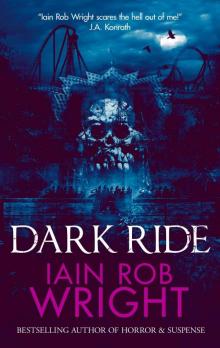 Dark Ride
Dark Ride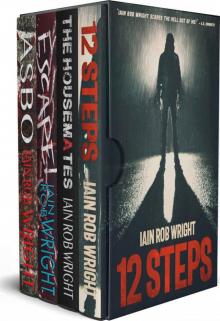 Gripping Thrillers
Gripping Thrillers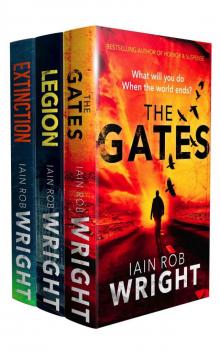 Hell on Earth Trilogy: The Complete Apocalyptic Saga
Hell on Earth Trilogy: The Complete Apocalyptic Saga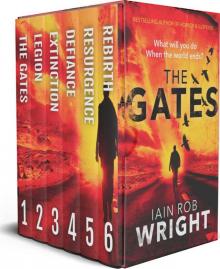 Hell on Earth- the Complete Series Box Set
Hell on Earth- the Complete Series Box Set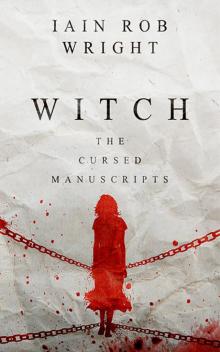 Witch: A Horror Novel (The Cursed Manuscripts)
Witch: A Horror Novel (The Cursed Manuscripts)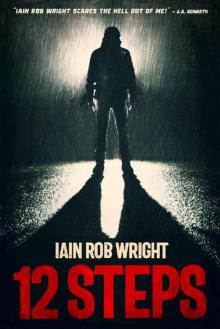 12 Steps
12 Steps A is for Antichrist
A is for Antichrist Blood on the Bar
Blood on the Bar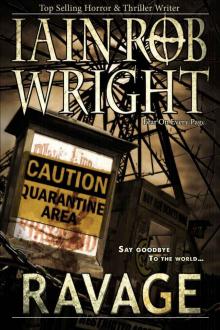 Ravage: An Apocalyptic Horror Novel
Ravage: An Apocalyptic Horror Novel Terminal (Major Crimes Unit Book 4)
Terminal (Major Crimes Unit Book 4)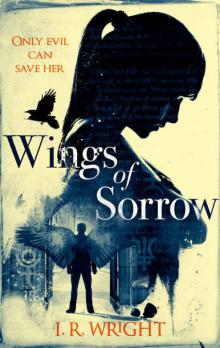 Wings of Sorrow (A horror fantasy novel)
Wings of Sorrow (A horror fantasy novel) Blood on the Bar (Lucas the Atoner Book 1)
Blood on the Bar (Lucas the Atoner Book 1)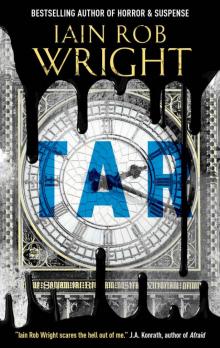 Tar: An apocalyptic horror novella
Tar: An apocalyptic horror novella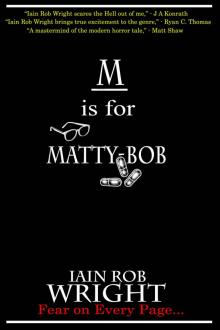 M is for Matty-Bob (A-Z of Horror Book 13)
M is for Matty-Bob (A-Z of Horror Book 13)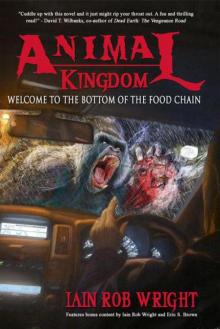 Animal Kingdom
Animal Kingdom Animal Kingdom: An Apocalyptic Horror Novel
Animal Kingdom: An Apocalyptic Horror Novel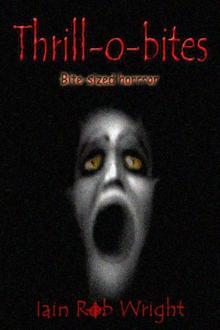 Thrillobytes: bite-sized horror
Thrillobytes: bite-sized horror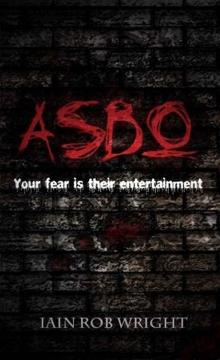 ASBO: A Thriller Novel
ASBO: A Thriller Novel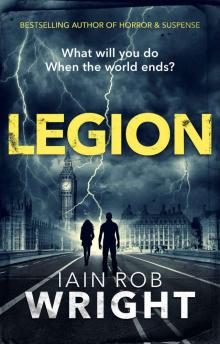 Legion: An Apocalyptic Horror Novel (Hell on Earth Book 2)
Legion: An Apocalyptic Horror Novel (Hell on Earth Book 2)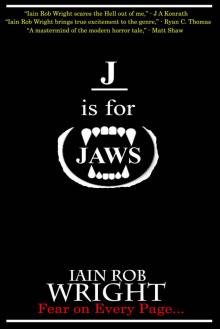 J is for Jaws (A-Z of Horror Book 10)
J is for Jaws (A-Z of Horror Book 10)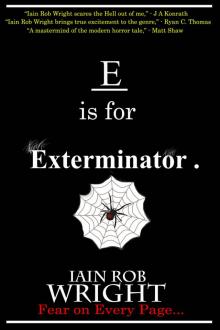 E is for Exterminator (A-Z of Horror Book 5)
E is for Exterminator (A-Z of Horror Book 5)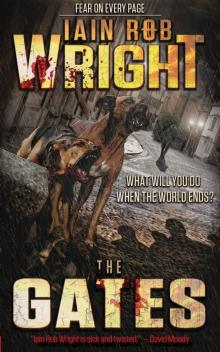 The Gates: An Apocalyptic Novel
The Gates: An Apocalyptic Novel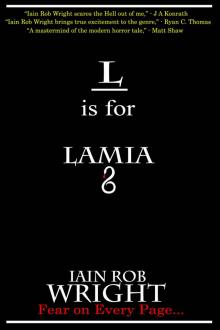 L is for Lamia (A-Z of Horror Book 12)
L is for Lamia (A-Z of Horror Book 12)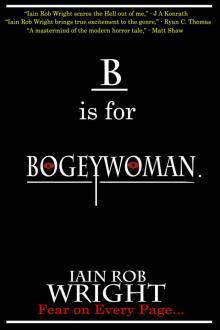 B is for Bogeywoman (A-Z of Horror Book 2)
B is for Bogeywoman (A-Z of Horror Book 2)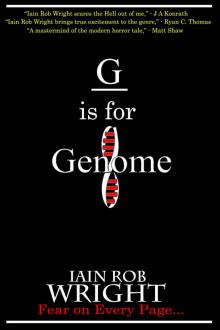 G is for Genome (A-Z of Horror Book 7)
G is for Genome (A-Z of Horror Book 7)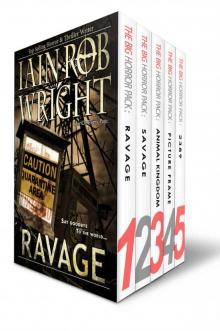 The BIG Horror Pack 2
The BIG Horror Pack 2 The Final Winter: An Apocalyptic Horror Novel
The Final Winter: An Apocalyptic Horror Novel The World's Last Breaths: Final Winter, Animal Kingdom, and The Peeling
The World's Last Breaths: Final Winter, Animal Kingdom, and The Peeling C is for Clown (A-Z of Horror Book 3)
C is for Clown (A-Z of Horror Book 3) Hot Zone (Major Crimes Unit Book 2)
Hot Zone (Major Crimes Unit Book 2)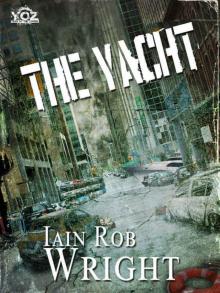 The Yacht (Year of the Zombie Book 3)
The Yacht (Year of the Zombie Book 3) Slasher: the Escape of Richard Heinz
Slasher: the Escape of Richard Heinz I is for Ice (A-Z of Horror Book 9)
I is for Ice (A-Z of Horror Book 9)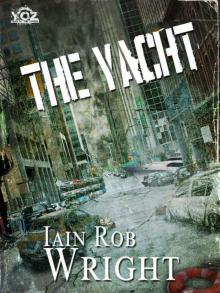 Year of the Zombie (Book 3): The Yacht
Year of the Zombie (Book 3): The Yacht The BIG Horror Pack 1
The BIG Horror Pack 1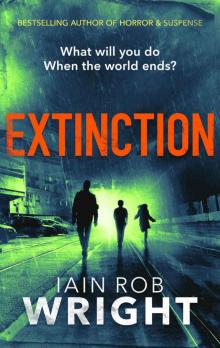 Extinction: An Apocalyptic Horror Novel (Hell on Earth Book 3)
Extinction: An Apocalyptic Horror Novel (Hell on Earth Book 3)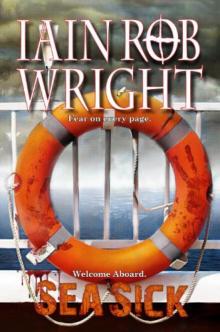 Sea Sick: A Horror Novel
Sea Sick: A Horror Novel The Peeling Trilogy
The Peeling Trilogy The Housemates: A Novel of Extreme Terror
The Housemates: A Novel of Extreme Terror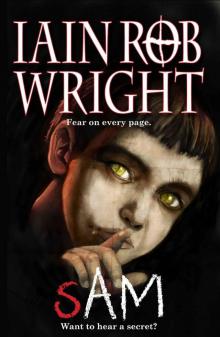 Sam
Sam